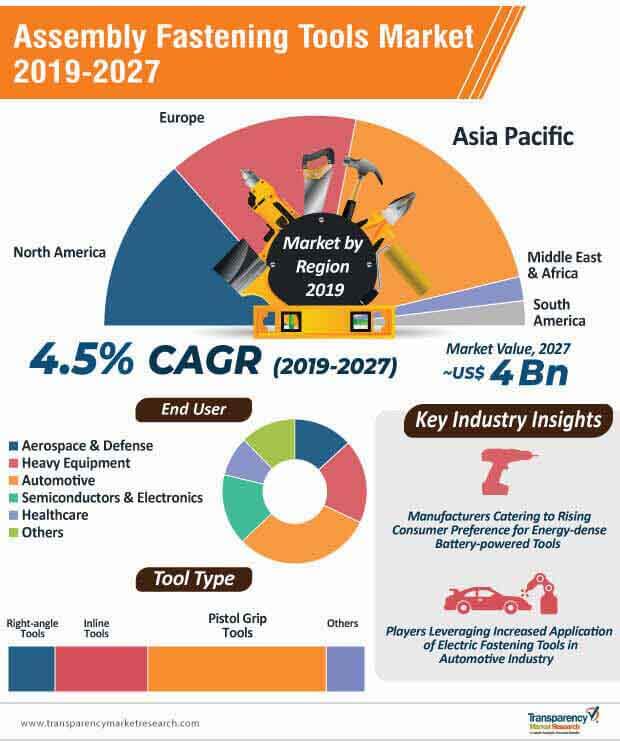
Transition from Corded to Cordless Positively Shaping Assembly Fastening Tools Market
As convenience and safety takes center stage, cordless power tools have been gaining popularity and user acceptance in recent years, in the manufacturing industry. They have improved the versatility of assembly fastening tools as well, by focusing on safety and flexibility, over their corded cousins, making them function without controllers, and thereby, improving operational efficiency. Increasing investments toward the R&D of cordless tools by players in the market, to cater to the ever-evolving needs of the manufacturing industry, have led to a significant positive impact on the global assembly fastening tools market. In 2018, although corded tools accounted for over-two third of the market revenue share, this number is expected to come down as the popularity of cordless tools rises. Cordless tools are expected to account for one-third of the global market share by revenue by the end of the forecast period.
The preference for cordless tools over corded ones, owing to the many advantages that they offer, has opened up several opportunities for manufacturers in the global assembly fastening tools market, as they continue to improve tool design, safety, and efficiency. They are being increasingly adopted across several industries, including automotive, aerospace, semiconductors, and heavy equipment.

Request a sample to get extensive insights into the Assembly Fastening Tools Market
Energy-dense Battery-powered Tools Gaining Popularity
The evolution of the cordless assembly fastening tools market space has also been influenced by the development of advanced power sourcing technology, addressing design challenges, and improving the proficiency of the product. The use of lithium ion batteries that provide increased run-time and performance is also gaining acceptance as against conventional batteries, which have to be traded frequently during the course of use. R&D in energy-dense batteries has led to newer battery designs and energy-dense batteries to keep pace with the requirements from several end use industries.
For instance, in 2018, Stanley Black & Decker, a major player in the global market, released a new battery design called the Flexvolt™, which changes voltage based on the requirement of the tool being used.
To understand how our report can bring difference to your business strategy, Ask for a brochure
Smart Manufacturing and Industry 4.0 Leading to Smarter Tools
Smart tools that are all connected to the Industrial Internet of Things (IIoT), which were once thought of as being very far into the future, have quickly become a reality. These smart tools are now being used to measure and store data, improving the efficiency of operations and reducing the rate of failures. They offer data from several data points, and the information provided can be used to significantly improve quality and precision, in a customized manner. These factors have contributed significantly to the growing popularity and widespread adoption of smart tools for the creation of a lean production environment – a tenet of Industry 4.0.
Industry 4.0 has fed the continual rise in the pace of manufacturing in recent years. Assembly fastening tools have also advanced and are increasingly becoming versatile, with even simpler tools offering exceptional precision, accuracy, and traceability. Manufacturing, as a whole, is now placing a premium on improved output, and assembly fastening tools and solutions are no exception.
Product innovation in the assembly fastening tools market is now beginning to include those that offer two-way communication as a standard, to ensure faster data sharing, error detection, and the like – all aimed at improving operational efficiency on the factory floor.
Alternative Joining Methods & Techniques to Hamper Market Growth
Several end-use industries of the assembly fastening tools market, who primarily rely on fastening as a joining technique, are considering alternatives that are lighter and cost-effective, which also offer design flexibility. These alternatives include structure adhesives such as acrylics, urethanes, and epoxies, which find application in fewer materials than fastening. The growing popularity of these alternatives to fastening is expected to hamper the growth of the global assembly fastening tools market.
However, because these structure adhesives may not find application in metal joining, their impact is negated by the versatility of fastening, thereby contributing to the growth of the assembly fastening tools market.
Stuck in a neck-to-neck competition with other brands? Request a custom report on “Assembly Fastening Tools Market”
Assembly Fastening Tools Market: Overview
- According to Transparency Market Research’s latest research report on the global assembly fastening tools market for the historical period of 2017 – 2018 and the forecast period of 2019 – 2027, increasing adoption of assembly fastening tools in smart manufacturing (or Industry 4.0) and high preference for electric fastening tools in smart manufacturing are major factors expected to fuel the global assembly fastening tools market during the forecast period.
- The global assembly fastening tools market is projected to be valued at ~US$ 3 Bn in the year 2019.
- In terms of revenue, the global assembly fastening tools market is estimated to reach a value of ~US$ 4 Bn by 2027, expanding at a CAGR of 4.5% throughout the forecast period.
High Preference for Electric Fastening Tools in Automotive Industry: A Key Driver
- The automotive industry has always been a leading end user of electric fastening tools, such as screw drivers and nutrunners, due to high automobile production and the large number of fasteners used in automobile assembly lines.
- Furthermore, with increasing demand for flexibility, error proofing, and quality control in automobile assembly lines, the preference for electric fastening tools has increased, thus boosting the growth of the global assembly fastening tools market.
- Thus, the automotive end user segment is expected to expand at a CAGR of ~5% during the forecast period, in the global assembly fastening tools market, and hold ~31% share of the global assembly fastening tools market by 2027.
Availability of Substitutes Such as Adhesives and Welding a Major Challenge
- Currently, several industries such as automotive, aerospace, and shipbuilding prefer structural adhesives such as acrylics, urethanes, and epoxies. Since these adhesives offer cost savings, lower weight, structural integrity, and design flexibility, their availability is expected to hamper the global assembly fastening tools market during the forecast period.
- However, adhesives are not designed or preferred specifically for metals or stainless steel yet. Hence, mechanical fasteners are still largely preferred for use in joining parts made of materials such as steel, aluminum, or other metals.
- Furthermore, adhesives add to the number of chemicals used within a plant, which further gives rise to environment-related issues. However, the impact of this restraint is expected to be low on the global assembly fastening tools market during the forecast period.
Global Assembly Fastening Tools Market: Competition Landscape
- Detailed profiles of assembly fastening tools market players have been provided in the report to evaluate their financials, key product offerings, recent developments, and strategies.
- Key players operating in the global assembly fastening tools market are –
- Ingersoll-Rand Plc
- Panasonic Corporation
- Estic Corporation
- Apex Tool Group
- Robert Bosch GmbH
- Atlas Copco AB
- Hilti Corporation
- HiKoki Co. Ltd
- Makita Corporation
- Stanley Black & Decker, Inc.
- Techtronic Industries Co. Ltd. (Tti)
- Uryu Seisaku, Ltd
Global Assembly Fastening Tools Market: Key Developments
Key providers of assembly fastening tools, such as Ingersoll-Rand Plc, Stanley Black & Decker, Inc., APEX Tool Group, Atlas Copco AB, and Estic Corporation are focusing on consistent investments in R&D and new product development to offer a diversified range of products and services to clients across the world. Some other key developments in the global assembly fastening tools market are:
- In 2019, Panasonic Corporation invested US$ 4,494.32 Mn in research & development to strengthen its product portfolio. In 2018, the company introduced its newly designed AccuPulse precision assembly tools.
- In 2018, Ingersoll-Rand Plc invested US$ 228.7 Mn in research & development to meet changing product requirements from several end-use applications. In the same year, the company launched more than 90 major new products and services.
- In 2018, Robert Bosch GmbH invested US$ 8.04 Bn in research & development activities. In 2019, the company launched an innovative power tool, i.e. new freak Bosch GDX18V-1800C. This upgraded tool has a design configuration with a half impact wrench and half impact driver and max torque of 1,800 In.-Lbs., which helps in delivering high power.
- In 2018, Stanley Black & Decker, Inc. invested US$ 275.8 Mn in research & development activities. In 2019, the company introduced a new power technique that can improve the power-to-size ratio of DC brushless tools. This would create a technological breakthrough in the company’s power tools product segment.
- In March 2019, Estic Corporation added high-torque fixture nutrunner tools to its product line of Z50 series. In 2018, the company added a protective cover for its angle-type tools. In the same year, the company added a tracer arm for its handheld nutrunners.
- In February 2019, Cleco, an APEX Tool Group company launched CellCore, cordless electric nutrunners that can withstand the toughest assembly line environment. The company also organized a product demonstration tour called CellTour truck, through which it visited key manufacturing facilities and industry events. In 2018, the company introduced pneumatic right-angle grinders with a compact and lightweight body, and a high performance motor, for demanding grinding applications in shipyards, foundries, etc.
- In 2018, Atlas Copco AB rolled out its new line of battery- and DC-powered low-reaction tools to eliminate torque overshoot and enhance ergonomics.
In the report on the global assembly fastening tools market, we have discussed individual strategies, followed by company profiles of providers of assembly fastening tools. The ‘Competition Landscape’ section of the global assembly fastening tools market has been included in the report to provide readers with a dashboard view and company market share analysis of key players operating in the global assembly fastening tools market.
Read Our Latest Press Release:
About Us
Transparency Market Research is a next-generation market intelligence provider, offering fact-based solutions to business leaders, consultants, and strategy professionals.
Our reports are single-point solutions for businesses to grow, evolve, and mature. Our real-time data collection methods along with ability to track more than one million high growth niche products are aligned with your aims. The detailed and proprietary statistical models used by our analysts offer insights for making right decision in the shortest span of time. For organizations that require specific but comprehensive information we offer customized solutions through ad-hoc reports. These requests are delivered with the perfect combination of right sense of fact-oriented problem solving methodologies and leveraging existing data repositories.
Contact
Transparency Market Research State Tower,
90 State Street,
Suite 700,
Albany NY – 12207
United States
USA – Canada Toll Free: 866-552-3453





